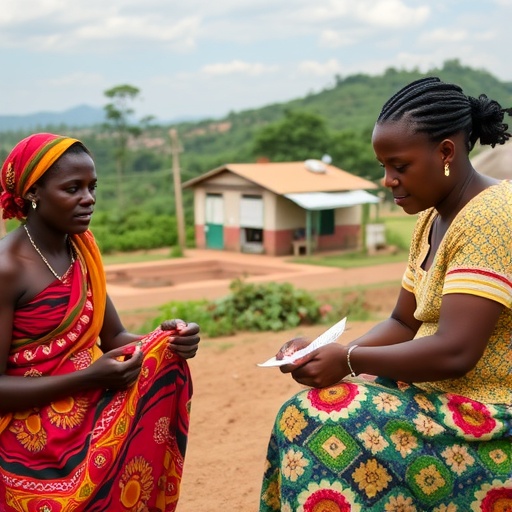In an unprecedented large-scale study, researchers have revealed the profound impact of Brazil’s Bolsa Família Programme (BFP) on reducing AIDS incidence and mortality among millions of women, particularly when intersecting vulnerabilities such as race, income, and education are taken into account. Coordinated by the Barcelona Institute for Global Health (ISGlobal) in collaboration with the National Institute of Allergy and Infectious Diseases (NAIDS/NIH), the investigation demonstrates how a targeted social intervention can dramatically alter epidemiological outcomes in a complex public health landscape. Published in Nature Human Behaviour, this research employs advanced causal inference methodologies to analyze extensive data from over 12 million low-income Brazilian women, providing compelling evidence that conditional cash transfers (CCTs) are powerful tools not just for socioeconomic upliftment but also for public health improvement.
Conditional cash transfer programs have long been recognized as crucial mechanisms to alleviate poverty by delivering financial aid tied to compliance with specific health and education criteria. These initiatives aim to combat the root social determinants of health by incentivizing behaviors like school attendance and regular health monitoring. The BFP, the largest of its kind globally, exemplifies this by requiring beneficiary families to participate in health checkups, mandatory schooling, and education initiatives that encompass sexual and reproductive health. This multifaceted approach targets the structural vulnerabilities that exacerbate disease risk, creating an environment conducive to early prevention and intervention.
Utilizing a quasi-experimental design and a rigorous causal inference framework, the study focused specifically on mothers and their daughters within recipient households from 2007 to 2015. By harnessing large-scale health and socioeconomic datasets, researchers dissected the nuanced ways in which overlapping disadvantages—such as poverty, racial identity, and educational attainment—modulate the program’s effectiveness. This intersectional analysis uncovered that the BFP was associated with a remarkable 47% reduction in AIDS incidence among daughters and a 55% decrease in AIDS-related mortality within this group, signifying an immense public health gain in the younger female population.
Among mothers, the study observed a 42% decline in AIDS cases and a 43% reduction in AIDS-related deaths, underscoring the program’s broad protective impact across generations. Of particular interest is the finding that black and brown women living in extreme poverty who possessed higher levels of education experienced the largest decrease in disease incidence—up to 56%. This suggests that education does not merely act as a social determinant but actively enhances the magnitude of health benefits derived from cash transfers, possibly by empowering individuals to better utilize health services and information.
Brazil’s national AIDS statistics align with the findings of this study, showing a near 30% drop in overall incidence between 2007 and 2021, and an even more substantial 40% decrease among women specifically. The BFP’s integration of financial aid with conditionalities centered on health and education likely contributes significantly to these improvements, offering a replicable model for public health policy. Mandatory school attendance coupled with health checkups and targeted health education—including sexual health promotion—reinforce protective behaviors and timely healthcare engagement, which are essential in HIV prevention and treatment paradigms.
Nutritional support, often an implicit benefit of cash transfer programs, further complements this approach by mitigating food insecurity and enhancing overall wellbeing—factors known to bolster immune function and improve treatment adherence. The BFP thus operates through complex, interrelated pathways that address the social, behavioral, and biological determinants of AIDS, providing a comprehensive framework for disease reduction.
What sets this research apart is its scale and methodological rigor, marking the first extensive assessment of how intersectional vulnerabilities influence the effectiveness of cash transfer programs on HIV/AIDS outcomes. By linking vast socioeconomic and health datasets, the researchers could examine subpopulations often marginalized and overlooked in classical epidemiological research, ensuring that intervention impacts are equitably measured across diverse demographic landscapes.
The study’s implications extend beyond Brazil’s borders, resonating globally in an era marked by rising inequalities and economic instability, which continue to fuel infectious disease proliferation. As Dr. Davide Rasella of ISGlobal, the study coordinator, highlights, conditional cash transfer programs hold untapped potential for mitigating morbidity and mortality from AIDS by addressing foundational social determinants, especially among those bearing multiple disadvantages.
More broadly, this investigation underscores the essential synergy between social policies and health outcomes, reinforcing that interventions designed to improve social welfare can have profound biological and epidemiological ramifications. It calls for integrated policy frameworks that transcend siloed approaches to health and social care, advocating for strategies that holistically address the needs of vulnerable populations.
The study’s robust evidence base advocates for the expansion and enhancement of conditional cash transfer initiatives worldwide, recommending policymakers prioritize education and health conditionalities to maximize protective effects. As global health systems grapple with persistent inequities, programs like Bolsa Família illuminate a pathway toward achieving Sustainable Development Goals by reducing health disparities and improving life expectancy among marginalized groups.
In conclusion, the Bolsa Família Programme exemplifies how strategic investment in social determinants, augmented by rigorous monitoring and educational components, can transform public health landscapes. This landmark study not only quantifies these impacts but also establishes a replicable analytical model for future evaluations, reinforcing the critical role of social policy as a determinant of health outcomes in HIV/AIDS and beyond.
Subject of Research: People
Article Title: Intersectional Impact of Cash Transfers on AIDS among 12.3 M Brazilian Women
Web References: https://www.nature.com/articles/s41562-025-02278-3
References: Silva, A. F., Lua, I., Jesus, G. S., Gestal, P. F., Cavalcanti, D. M., Santos, C. A., Ichihara, M. Y., Barreto, M. L., Magno, L., Souza, L. E., Macinko, J., Dourado, I., & Rasella, D. (2025). Intersectional Impact of Cash Transfers on AIDS among 12.3 M Brazilian Women. Nature Human Behaviour. https://doi.org/10.1038/s41562-025-02278-3
Keywords: AIDS policy, Education, Social decision making




